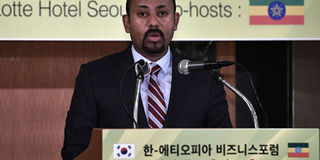In a volatile region, Kenya needs a stable and prosperous Ethiopia

Ethiopian Prime Minister Abiy Ahmed speaks during a business forum in Seoul on August 27, 2019. For many years, Kenya left the security issues to do with Somalia largely to the able hands of Ethiopia. PHOTO | JUNG YEON-JE | AFP
What you need to know:
- There is a circle of uncertainty around the region which provides much food for thought for those who want to think about the next 50 years.
- And in the region, it would help if Ethiopia were to remain stable, become prosperous and continue the spirit of Haile Selassie.
Emperor Haile Selassie is famously beloved of pot-smoking rastas. Ethiopian colours have been adopted by this popular movement with its base in the Caribbean.
But he is venerated by African revolutionaries from the Mau Mau to the African National Congress because of his support for African rebellion against colonialism and racism.
There are legends about villagers trekking hundreds of kilometres through the northern wastelands of Kenya and into Ethiopia to receive military training and weapons.
One such fighter, General Mathenge, disappeared while on such a mission and rumours have persisted that he still lives in the land of the emperor.
So much so that during the first Narc government, a mission was dispatched to bring him home. And so arrived Lemma Ayanu to a warm welcome by representatives of communities in a desperate need of a hero.
SECURITY
Koigi Wamwere, a lover of freedom, gave a passionate speech thanking the government for restoring Gen Mathenge to us. I remember David Mwenje, the MP for Embakasi, was somewhere in the mix.
Only Mr Ayanu was no lost Mau Mau general. He was an Ethiopian peasant. Nothing, of course, was said of then-bigger Mau Mau hero with whom Mathenge travelled to Ethiopia and who later became Mau Mau’s chief armourer, making most of the home-made guns used by the fighters.
Maj Ruku, who fought in World War II, was killed early in the war and his contribution to the struggle was lost in the stampede to claim credit for independence by fake Mau Mau, home guards and colonial soothsayers who inherited the Kenyan state and have since robbed it into penury. But I digress.
Ethiopia continued to play a central role in Kenya’s security after independence, some kind of benevolent big brother, acting as a buffer to the expansionist instincts of Mogadishu.
So much so that for many years, Kenya left the security issues to do with Somalia largely to the able hands of Ethiopia.
JUBALAND
And for those years, according to the people I have been talking to, Ethiopia has been used to a relationship where Kenya deffered to its partner on security issues.
Until Kenya, battered by Al-Qaeda, Al-Shabaab and every description of malcontent rising out of the conflict in Somalia, decided to be a little bit more assertive and sent an army across the border.
Now I hear that Kenya and Ethiopia are almost coming to blows over Jubaland, a region created largely from the machinations of Nairobi to provide a buffer between Somalia and the eastern border.
I hear talk of two Ethiopian military Antonovs with troops, who were allegedly stopped from landing in Kismayu, where Ethiopia opposes the rule of Sheikh Ahmed Madobe, Jubaland’s freshly re-elected president and our favourite warlord.
INSTABILITY
The dynamic in Ethiopia has changed dramatically, with possible implications for that old security pact with Kenya.
The traditional Ethiopian antipathy towards Somalia, arising out of previous conflict, is a lot less today and there is a belief that Prime Minister Abiy Ahmed, an Oromo Muslim, is likely to be much more tolerant and accommodating than many of Ethiopia’s previous leaders.
There is actually fevered talk in some chatrooms about the creation of an Islamic Cushitic Federation, covering parts of Ethiopia, Northern Kenya and segments of Somalia, among other federation concepts, theories and dreams.
One argument I have seen in a thread on the internet runs like this: “And we could enslave the Tigre and Amhara and either breed with their women to make each ethnic bloc bigger or we could sell them to Khaleej Arabs, or we could do both.”
This interesting suggestion was made on Sunday, December 13, 2015. It was not made in 1815. It is this kind of unhelpful, backward thinking that takes me to my main point: It’s a perilous neck of the woods.
Sudan is in terrible shape and who knows what type of insecurity it is going to export to other parts of the neighbourhood?
South Sudan is an unstable equilibrium at the best of times. It does not take much for the guns to come out and for gains made to be lost.
WAR FOOTING
To the West, President Yoweri Museveni of Uganda and President Paul Kagame of Rwanda have, while you were not looking, been gently and quietly wrapping their hands around each other’s throats.
They have closed the border between their two countries; they have blocked access to each other’s media and they are, generally, on a war footing.
To the south, President John Pombe Magufuli doesn’t quite like his northern neighbour much. I doubt that if Kenya were to run into big trouble, anyone’s first thought would be to call President Magufuli for help.
There is a circle of uncertainty around the region that provides much food for thought for those who want to think about the next 50 years.
Global warming will make it very difficult for our grandchildren to feed themselves.
Internationally, the rise of racism will be a serious challenge now that it is increasingly becoming mainstreamed in the West.
And in the region, it would help if Ethiopia were to remain stable, become prosperous and continue the spirit of Haile Selassie.





